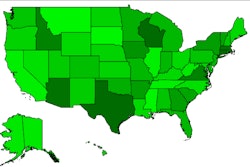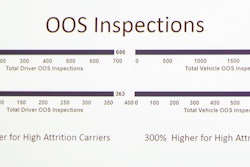Readers responded to Friday’s news of the Federal Motor Carrier Safety Administration’s wholesale removal of the CSA Safety Measurement System from public view, pending changes to comply with the FAST Act highway bill’s reform provisions, with mixed opinions. While some viewed the removal as a victory for trucking, others were more circumspect. Those included Richard Spencer of Illinois, who wondered whether “this is the right way” to make needed changes in trucking. “I work hard for my decent rating,” he said, objecting to what he viewed as being in effect thrown into the same barrel as others “who don’t.”
Spencer’s thoughts on the CSA SMS’ removal echoed those of another caller you can hear in the podcast below, rounding up a few voice responses to the news from Friday and followed by thoughts of operators when the chance of SMS scores’ removal reared its head early this year.
Chauncy London, commenting on Overdrive‘s Facebook page, wondered what exactly had changed with the lack of public availability of CSA’s percentile rankings, cracking wise, “So the only thing that changed is that our CSA scores aren’t public? Great, because that changed a lot. Insurance companies, shippers and employers can still see everything, so this isn’t really a win for us. Good job, FMCSA.”

Private access to the percentile rankings continues for motor carriers as well as law enforcement, as FMCSA made clear in its release on Friday attendant to the SMS website going down. Such access, London suggests, will just facilitate continued use of the scores as due diligence by shippers, brokers, insurance companies and others who have come to routinely utilize the scores to review carriers as a condition of doing business.
The preservation of the status quo that London envisions is of a piece with what OOIDA Executive Vice President Todd Spencer noted to me last year about public availability and CSA SMS’ use by third-party entities. He said simply removing scores from the public might have little effect without a program revamp, given there would like be a sort of “cat’s-out-of-the-bag” effect in third-party reliance on the scores. As I wrote last year, “if the scores were available only to law enforcement and carriers themselves,” the situation as of today given the pulling of the SMS, “some shippers [and other entities] then likely would require disclosure as part of carrier contracts.”
And regular readers will recall reader Thomas Little‘s thoughts on the move by so many trade organizations to do what has happened today — get a revamp of the program going via Congressional action, and pull the scores from public view. Here’s what Little said then:
With CSA, “FMCSA fully intended,” Little wrote, to “let the industry do their policing for them. Spoon-feed the detailed data into the marketplace to drive consumer choice of motor carrier [and] insurance rates, and give the ambulance chasers one more tool in their arsenal. And then stand back and pretend that wasn’t how CSA was supposed to be used.
“I like what the trade orgs are trying to do, but they won’t be able to unring that bell.”
With just a couple days gone since FMCSA pulled the SMS, there’s evidence that the bell continues to ring. Vigillo’s Steven Bryan, writing at the Vigillo blog earlier today, noted he expected his company’s CSA service to motor carriers to continue uninterrupted. Furthermore, the company “Carrier Select” service to shippers and brokers, a window into participating carriers’ CSA performance metrics, is getting an upgrade to usher it into what Bryan calls the “private CSA world. Vigillo is introducing an upgrade to Carrier Select that will rely on a free opt-in model whereby Motor Carriers may elect to continue to share CSA Scores through Vigillo to the business partners they decide to share with. Since 2011, Vigillo has offered a product called Carrier Select, designed to give Brokers and Shippers a way to monitor key safety data of its partner Motor Carriers. In the past 5 years, CSA has been a critical component of the due diligence that Brokers and Shippers have come to expect. We don’t believe that will change now that CSA is private.”
Absent the clarity on carrier selection that would have been provided with an “Interim Hiring Standard” that didn’t stand to ice the 90 percent of motor carriers that remain unrated or Conditional — cross-reference the badly-written ‘poison pill’ provision I’ve written about several times, no version of which made it into the final version of the highway bill — as Bryan sees it “brokers and shippers are still responsible for conducting due diligence, including CSA Scores.”
Time will tell whether such services become the private-CSA norm for most.
Good news is that a CSA program revamp is in fact ordered by the bill, and that includes much that would seem to create a better mousetrap, including an intensive review of ways to improve the inequities of the program by the National Research Council of the National Academies. The bill specifies a deadline of 18 months out for such a study, which the DOT noted prior to passage that it viewed as “onerous” and having “little or no safety benefit.” It also used that final language in reference to the “Beyond Compliance” SMS “credit” program also included in the bill, requiring development of such a program to give credit to companies that go above and beyond the letter of the law for safety, whether through advanced technologies or other means. I’ll have more on that program in the coming days. Regular readers will recall it was floated by the DOT earlier this year in a request for comments.
Find more detail on many of the highway bill’s trucking provisions via this link.



![shutterstock_50107477 [Converted].eps](https://img.overdriveonline.com/files/base/randallreilly/all/image/2014/09/ovd.GOLDEN-TRIANGLE.png?auto=format%2Ccompress&fit=crop&h=167&q=70&w=250)






